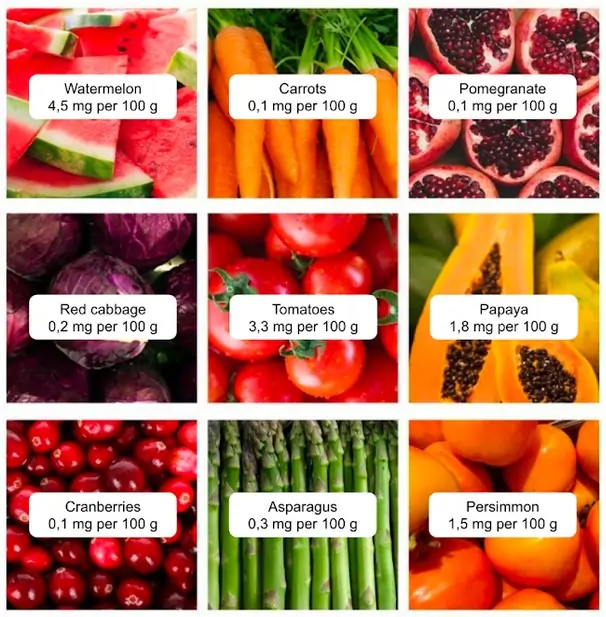From Tomatoes to Tresses: Benefits of Lycopene Supplements on Hair Health and Beyond
Last edited, 19 February 2024
With its presence as a potent antioxidant in nature’s vibrant array, the advantages of lycopene are abundant. This powerful compound has surfaced as a dynamic force in bolstering both hair health and overall well-being.
At IdealofMeD, we have designed our Hair Vitamins with a crucial 15 mg of lycopene. providing you with the ultimate key to unlocking a revitalized, vibrant self.
In this article, I will explore what lycopene is, its health benefits, its connection to hair health, foods rich in lycopene, the effectiveness of lycopene supplements, potential side effects, and ways to enhance its absorption.
Table of Contents
What is Lycopene?
Lycopene is a red, lipophilic (fat-soluble) pigment found primarily in certain fruits and vegetables, particularly tomatoes, watermelons, pink grapefruits, and guavas. It belongs to the carotenoid family, which includes other well-known compounds like beta-carotene (found in carrots) and lutein (found in leafy greens). Unlike some carotenoids, lycopene lacks pro-vitamin A activity but is renowned for its potent antioxidant properties.
Health Benefits of Lycopene
A study focusing on carotenoids have demonstrated that these compounds, including Lycopene as a non-provitamin A carotenoid, and retinoids, share several key biological roles. These functions encompass serving as antioxidants, impeding the progression of cancerous tumors, and initiating controlled cell death.
Integrating carotenoids into your diet through supplementation can influence cellular growth, manage gene expression, and modulate immune responses. Observational research has highlighted a connection between a diet abundant in carotenoids and a decreased vulnerability to conditions like breast, cervical, ovarian, and colorectal cancers, as well as heart and eye-related illnesses.
Antioxidant Protection: Lycopene is a powerful antioxidant, which means it helps combat harmful free radicals in the body. By doing so, it may contribute to reducing the risk of chronic diseases like heart disease and cancer.
Heart Health: Studies have suggested that lycopene intake is associated with a decreased risk of cardiovascular diseases and premature dying from these diseases. It may help lower blood pressure, reduce LDL cholesterol levels, and improve blood vessel function.
Cancer Prevention: Lycopene has been extensively researched for its potential in preventing certain types of cancer, particularly prostate, breast, lung, and stomach cancer. Its antioxidant properties may help protect cells from damage that could lead to cancerous growth.
Skin Health: Lycopene has been linked to protecting the skin from UV radiation damage and may help in maintaining a youthful complexion.
Bone Health: Lycopene may play a supporting role in maintaining strong bones. Estrogen deficiency, an independent risk factor for bone fragility, has been linked to an increase in oxidative stress.
Research suggests that lycopene’s antioxidant properties could help combat oxidative stress and inflammation, which are factors contributing to bone loss and conditions like osteoporosis.
Diabetes Management: Diabetes is a chronic condition characterized by high blood sugar levels, often resulting from impaired insulin function. Lycopene, with its antioxidant and anti-inflammatory properties, can be a valuable addition to the diet of individuals with diabetes. Studies have indicated that lycopene may help regulate blood sugar levels, enhance insulin sensitivity, and reduce complications associated with diabetes, such as cardiovascular disease.
Lycopene and Eye Health: Lycopene may help protect the eyes from oxidative damage caused by exposure to ultraviolet (UV) radiation and free radicals. This protection can potentially reduce the risk of age-related eye conditions such as cataracts and macular degeneration.
Lycopene and Male Fertility: Lycopene has gained attention for its potential role in promoting male fertility. It is believed that lycopene’s antioxidant properties help protect sperm from damage caused by oxidative stress. Additionally, some studies suggest that lycopene may enhance sperm motility, improving the chances of successful fertilization.
Role of Lycopene in Hair Health
Lycopene’s benefits extend to hair health as well. The antioxidant properties of lycopene can help combat oxidative stress in the hair follicles, which is a common contributor to hair loss and premature graying. By neutralizing free radicals, lycopene may promote healthier, shinier hair and slow down the aging process of hair follicles.
Premature graying often occurs due to a decrease in melanin production, the pigment responsible for hair color. While lycopene’s direct impact on melanin production is not fully understood, its antioxidant properties may help protect the hair follicles and melanocytes (the cells responsible for producing melanin) from oxidative stress and damage. By reducing oxidative stress in the scalp and promoting overall hair follicle health, lycopene could potentially slow down the premature graying process.
When seeking products to support healthy hair and natural melanin production, choosing those containing lutein, lycopene, astaxanthin, and probiotics can be a scientifically grounded approach, as these compounds offer various benefits, including potential support for melanin production, and can contribute to overall hair health.
Lycopene Benefits: Alona's Key points
In summary, lycopene demonstrates a strong correlation with
- enhanced cardiovascular well-being
- effective diabetes management
- improved male fertility
- skin health promotion and sunburn prevention
- a protective role against specific types of cancers
Moreover, its antioxidant properties contribute to mitigating oxidative stress in hair follicles, addressing concerns like hair loss and premature graying. IdealofMed’s Hair Rejuvenation Vitamins contain lycopene alongside 31 other essential nutrients, providing comprehensive daily support for overall well-being.
12 Lycopene Rich Foods
To reap the benefits of lycopene, consider incorporating these lycopene-rich foods into your diet:
- Tomatoes: Tomatoes are perhaps the most well-known source of lycopene, containing about 3.3 mg per 100 grams when cooked.
- Watermelon: This refreshing fruit contains approximately 0.6 mg of lycopene per 100 grams.
- Guava: Guavas are packed with lycopene, providing around 5.2 mg per 100 grams.
- Pink Grapefruit: Pink grapefruit contains approximately 0.4 mg of lycopene per 100 grams.
- Papaya: Papayas are rich in lycopene, with roughly 1.1 mg per 100 grams.
- Red and Pink Bell Peppers: Red and pink bell peppers offer about 0.1 mg of lycopene per 100 grams.
- Tomato Sauce: Cooked tomato sauce contains a concentrated amount of lycopene, with approximately 13 mg per 100 grams.
- Tomato Paste: Tomato paste is another concentrated source, providing roughly 25 mg of lycopene per 100 grams. Choose tomato sauce and paste with minimum preservatives, pay attention to organic ones.
- Canned Tomatoes: Canned tomatoes have around 2.5 mg of lycopene per 100 grams.
- Ketchup: Ketchup contains about 2.7 mg of lycopene per 100 grams. Select home-made or organic options.
- Sun-Dried Tomatoes: Sun-dried tomatoes are particularly rich, with approximately 45 mg of lycopene per 100 grams.
- Pink Guava Juice: Pink guava juice is a potent source, offering around 4.2 mg of lycopene per 100 grams.
Please note that the lycopene content can vary slightly depending on factors like ripeness and processing methods.
Lycopene Rich Foods
(Amount of Lycopene per 100 grams of product)
Based on the following table you can count approximately how much fruits and vegetables you should eat every day to reach a minimum daily dose of lycopene. And it would be roughly 200 g of Watermelon, 300 g of tomatoes, 200 g of bell peppers or guava or you can take 1 vitamin a day of our Hair Rejuvenation Vitamins.

Enhancing Lycopene Absorption
To maximize lycopene absorption from foods, consider the following tips:
Cook Tomatoes: Heat processing, such as cooking tomatoes, can increase the bioavailability of lycopene. Tomato-based sauces, soups, and stews are excellent choices.
Pair with Healthy Fats: Lycopene is fat-soluble, so consuming it with healthy fats like olive oil or avocados can enhance absorption.
Include a Variety of Sources: Incorporate a diverse range of lycopene-rich foods into your diet to ensure a well-rounded intake of this nutrient.
Your Beauty and Longevity Specialist at idealofmed.com
Hi! I’m Alona, your expert in beauty and long-lasting vitality, especially when it pertains to hair vitamins.
Feel free to connect with one of IdealofMeD’s specialists today! Don’t hesitate to reach out if you have any questions regarding our vitamins. We’re here to support on your journey to healthier, more vibrant hair!
- we are online
Lycopene Supplements: Are They Effective?
Lycopene supplements are available in various forms, including capsules, softgels and multivitamin complexes. While they can provide a convenient way to increase lycopene intake, it’s important to note that the effectiveness of supplements may vary. Obtaining lycopene from a balanced diet is generally recommended, as whole foods naturally contain a combination of nutrients. However, one should take into account if there is access to local markets with organic and nutritional products, as well as season, and even personal taste preferences and ability to consume certain amounts of fruits and vegetables daily, so it might be reasonable to take lycopene in a multivitamin.
Precisely-engineered multivitamins, as Hair Rejuvenation Vitamins, are equally noteworthy, featuring a unique blend of nutrients strategically combined, so all its compounds work synergistically.
Potential Side Effects and Risks of Lycopene Supplements
Lycopene supplements are generally considered safe when taken at recommended doses. However, excessive consumption may lead to certain side effects, including digestive issues and skin discoloration (known as lycopenodermia), to make a rough example – one should consume 2 liters of tomato juice every day for several months or even years to come to the point of lycopenodermia. As with any supplement, it’s advisable to consult with a healthcare professional before adding lycopene supplements to your routine, especially if you have underlying health conditions, taking any medications, or you are pregnant.
Summary
Lycopene, found abundantly in colorful fruits and vegetables, offers a multitude of health benefits, including its potential role in promoting hair health. By adding lycopene-rich foods to your diet and making informed choices about supplements, you can harness the power of this antioxidant to support overall well-being and enjoy the many advantages it offers. Remember that a balanced diet and a healthy lifestyle are key to reaping the full benefits of lycopene and maintaining optimal health.










